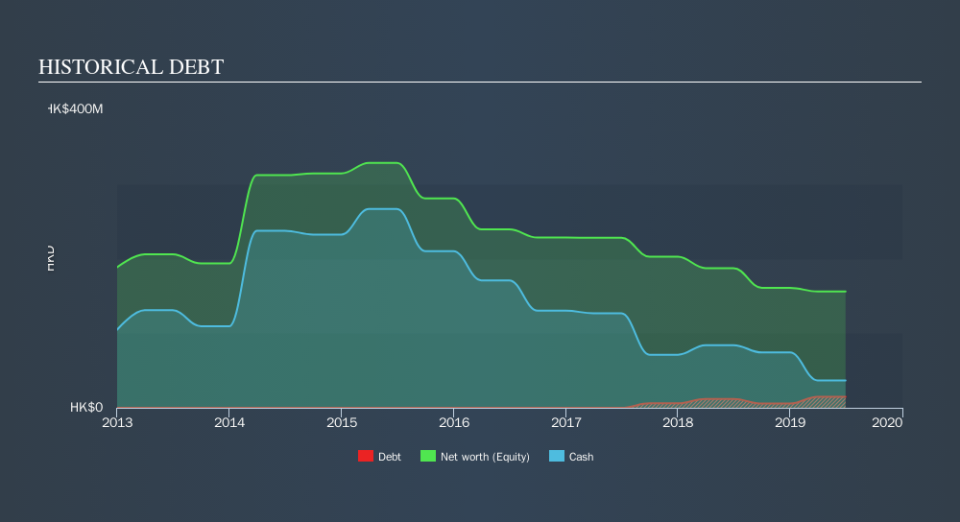Is Carry Wealth Holdings (HKG:643) Using Too Much Debt?

Warren Buffett famously said, 'Volatility is far from synonymous with risk.' It's only natural to consider a company's balance sheet when you examine how risky it is, since debt is often involved when a business collapses. We can see that Carry Wealth Holdings Limited (HKG:643) does use debt in its business. But the more important question is: how much risk is that debt creating?
What Risk Does Debt Bring?
Generally speaking, debt only becomes a real problem when a company can't easily pay it off, either by raising capital or with its own cash flow. If things get really bad, the lenders can take control of the business. However, a more frequent (but still costly) occurrence is where a company must issue shares at bargain-basement prices, permanently diluting shareholders, just to shore up its balance sheet. Of course, plenty of companies use debt to fund growth, without any negative consequences. The first step when considering a company's debt levels is to consider its cash and debt together.
Check out our latest analysis for Carry Wealth Holdings
What Is Carry Wealth Holdings's Net Debt?
As you can see below, at the end of June 2019, Carry Wealth Holdings had HK$14.9m of debt, up from HK$11.9m a year ago. Click the image for more detail. However, its balance sheet shows it holds HK$36.6m in cash, so it actually has HK$21.7m net cash.
How Strong Is Carry Wealth Holdings's Balance Sheet?
We can see from the most recent balance sheet that Carry Wealth Holdings had liabilities of HK$70.6m falling due within a year, and liabilities of HK$16.1m due beyond that. On the other hand, it had cash of HK$36.6m and HK$68.2m worth of receivables due within a year. So it can boast HK$18.1m more liquid assets than total liabilities.
This short term liquidity is a sign that Carry Wealth Holdings could probably pay off its debt with ease, as its balance sheet is far from stretched. Simply put, the fact that Carry Wealth Holdings has more cash than debt is arguably a good indication that it can manage its debt safely. There's no doubt that we learn most about debt from the balance sheet. But you can't view debt in total isolation; since Carry Wealth Holdings will need earnings to service that debt. So when considering debt, it's definitely worth looking at the earnings trend. Click here for an interactive snapshot.
In the last year Carry Wealth Holdings wasn't profitable at an EBIT level, but managed to grow its revenue by13%, to HK$343m. We usually like to see faster growth from unprofitable companies, but each to their own.
So How Risky Is Carry Wealth Holdings?
Statistically speaking companies that lose money are riskier than those that make money. And in the last year Carry Wealth Holdings had negative earnings before interest and tax (EBIT), truth be told. And over the same period it saw negative free cash outflow of HK$45m and booked a HK$40m accounting loss. With only HK$21.7m on the balance sheet, it would appear that its going to need to raise capital again soon. Even though its balance sheet seems sufficiently liquid, debt always makes us a little nervous if a company doesn't produce free cash flow regularly. When we look at a riskier company, we like to check how their profits (or losses) are trending over time. Today, we're providing readers this interactive graph showing how Carry Wealth Holdings's profit, revenue, and operating cashflow have changed over the last few years.
If you're interested in investing in businesses that can grow profits without the burden of debt, then check out this free list of growing businesses that have net cash on the balance sheet.
We aim to bring you long-term focused research analysis driven by fundamental data. Note that our analysis may not factor in the latest price-sensitive company announcements or qualitative material.
If you spot an error that warrants correction, please contact the editor at editorial-team@simplywallst.com. This article by Simply Wall St is general in nature. It does not constitute a recommendation to buy or sell any stock, and does not take account of your objectives, or your financial situation. Simply Wall St has no position in the stocks mentioned. Thank you for reading.


